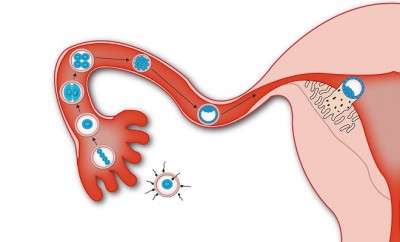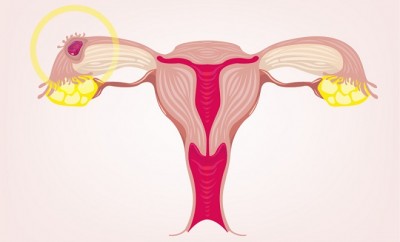Discover the Most Common Implantation Symptoms!
Implantation is the initial stage of pregnancy that occurs approximately on the 7-12 day post conception. The ovum cells divide a lot of times until it becomes a zygote, which is then attached to the uterine wall. After the embryo is implanted into the uterus, most women experience various implantation symptoms, such as spotting, cramping, breasts tenderness, lower back pains, strong food cravings, hot flashes, fatigue and unusual bleeding. If you feel at least one of them, you may be pregnant!
In case you experience bleeding, cramping or other signs of implantation, the best way to confirm pregnancy is to do a pregnancy test. However, if you see just one line on the strip, don`t get upset. Scientists have proven that the longer a woman waits to test after ovulation, the more accurate and close to reality the results will be. If you have some of the symptoms presented below, you should consider making an appointment with your doctor, because you might be pregnant even with the negative test result. Also, if you don’t experience all these symptoms, there is no need to panic, because every single pregnancy is different.
Common Implantation Symptoms
Breast Tenderness
This is a very common symptom post implantation. As the breasts are growing during the pregnancy period, they also become tender and ultrasensitive. This tenderness is caused by two powerful hormones, progesterone and estrogen. Also, the increased blood flow into that area is one of the causes of this symptom. The truth is that your breasts are getting ready for future motherhood and becoming the source of nutrition for your baby.
In addition to that, you might notice other breast changes, such as enlarged veins in the breast area, darker and more sensitive nipples, larger areolas (circles around the nipples).
Food Cravings and Aversions
Some women may experience an increased sense of smell and taste during the ovulation period. However, almost all of them will face strong cravings after implantation too. Amazingly, women might get an aversion to their favorite foods, gaining at the same time a strong desire to try new ones.
No Period
Actually this is the most reliable implantation and pregnancy symptom. Women, who have conceived, face such phenomenon as a missed period. However, keep in mind that the regular menstruation might not arrive because of other reasons, for example, because of major illnesses, surgery or high levels of stress. There are other signs you need to look for in order to determine whether you are pregnant or not.
Morning Sickness
The most frequently discussed symptom of successful implantation. Almost 99% of all women who get pregnant will have to pass through this daunting part of the day. Marked by vomiting and nausea, morning sickness can wreak havoc in your day-to-day life. You might also experience strong backaches and headaches. In this case, ginger could prove extremely useful, because it minimizes the negative impact of morning sickness and nausea.
Other Implantation Symptoms
In addition to the signs, described above, you might experience other related symptoms that are not “programmed” and occur in 30% of pregnancies or even more rarely. This is why it is imperative to know these characteristic features of the first trimester in order to determine quickly, if you are truly pregnant or not.
Cramping and Spotting
More than often cramping and spotting are ovulation signs, but they can also become implantation symptoms if they occur 7-12 days after the ovulation date. In this case, you can notice a pinkish-brown vaginal discharge on your underwear. While some women may experience moderate or sometimes severe spotting after the implantation took place, others notice spotting only one-two weeks after.
Cramping is another not-so-common symptom which usually appears after one week post implantation. During this period, your uterus is continually contracting. If you become pregnant, the fetus will grow slowly and push the wall of the uterus. That is why mild spasms can be felt. In general they are normal. What is abnormal is when cramping becomes more intense and unbearable, and when it is accompanied by heavy bleeding. In such cases, as doctors say, the probability of an early miscarriage is over 90%.
Unusual Bleeding
If your bloody discharge is quite thick and with clot-like admixture, you are very prone to experience a miscarriage. In addition to this, severe pain in the vaginal area might indicate an ectopic pregnancy, which needs to be terminated anyway. However, if you have other symptoms and your bleeding is mild, your pregnancy can be healthy. Keep your eyes open for all signs your body gives you and try to determine if they occur after 7-12 days post implantation.
Constipation
Constipation itself is not something out of order, but when it is associated with morning sickness, cravings, cramping and spotting, it means that you are pregnant. Due to the enhanced hormones that flow through your body at a breakneck speed, your intestines become more relaxed. As a direct result, you might get constipated. The good news is that there are plenty of remedies against constipation, including some very potent over-the-counter medicines. However, before taking pills, check up on your doctor first of all.
Fatigue
When you become pregnant, your metabolic rate increases exponentially, because it needs to support both you and your baby. It is a huge workload on the woman`s organism. The outcome – you are far more tired than you were a couple of weeks ago. In addition to the desire to sleep more, you will feel tired all day long, because the hormone progesterone, which is vital during pregnancy, has a sedative effect. If you crave to sleep, even if it means that you have to take a day off, don’t hesitate to do so. Your baby will thank you for having a rest.
Acne and Pimples
Lastly, another implantation symptom you might experience in the early pregnancy stage is acne or pimples. In case you deal with this symptom, try not to squeeze them, because it can leave scars and spoil with them your face.
Conclusions
All these implantation symptoms are extremely common nowadays, especially for women who haven’t been pregnant before. While some of the signs can be treated, others are only like a patience test, because they will pass in time. Focus on your baby’s needs and stay positive, and your pregnancy will be easy.
Recommended reading:
Signs of Implantation Bleeding – Implantation Bleeding and Symptoms
Implantation Bleeding – Top 5 Signs Indicating Early Pregnancy!
Signs of Implantation: What to Look For
Implantation Spotting or Light Bleeding – Signs and Symptoms
Signs Of Successful Implantation: Why It Is Important To Stay Optimistic
Can You Feel Implantation? A Guide To Implantation Bleeding















